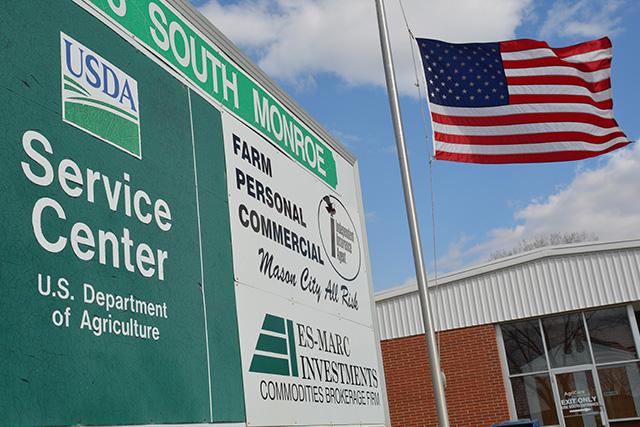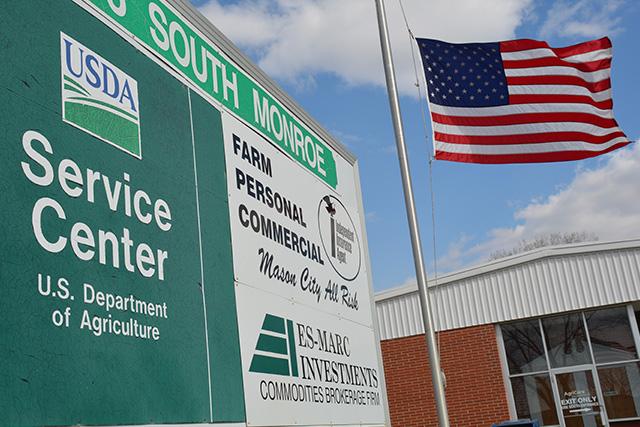Ag Policy Blog
Senators, USDA Offer Different Takes on Modernizing Foreign Land Ownership Reports
A bipartisan group of U.S. senators wants to know what USDA is doing to streamline the process for electronic filing and disclosures of foreign land ownership. USDA counters the funding is lacking for the department to effectively modernize the process.
The Government Accountability Office (GAO) back in January found USDA staff still require people to fill out their investments on foreign land on paper at county offices then send those forms to USDA headquarters where they are then keyed in and subject to human error. The forms are required under the 1978 Agricultural Foreign Investment Disclosure Act, known as AFIDA.
Nationally, 3.4% of agricultural land is foreign owned or about 43.4 million acres. The level of foreign land purchases increases about 3-4 million acres per year.
The Consolidated Appropriations Act of 2024 -- which Congress passed back in March -- mandated USDA set up a way for landowners to file the AFIDA forms electronically, and create an online database of AFIDA disclosures.
In a letter sent Monday, 14 senators -- ten Republicans and four Democrats -- the senators wanted to know what USDA is doing to create electronic disclosures and reduce errors in creating the records. Lawmakers sent six questions they wanted addressed, including "what further direction from Congress -- as specifically as possible -- would the (Farm Service Agency) need to transition to an online submission system?"
DTN reached out to both senators and USDA about the funding levels provided to update the AFIDA process.
A USDA spokesperson replied that the department has shared with senators and House members that it is a complex task to track and report foreign-owned land across more than 3,000 counties and 500 sovereign tribal nations. The FY 2024 funding "failed to provide sufficient funding for both program modernization and additional staff to support this work, including the required complex research and product development to create an online filing portal and an internet database with the disaggregated data from each disclosure submitted."
The appropriations bill "also cut the budget of the USDA agency that would be tasked with implementing this portal, which further complicates the Department's effort to meet this Congressional mandate. USDA will continue working to make improvements through regulatory and administrative updates as much as possible using the relatively low funding and authority provided by Congress."
Congress actually directed USDA in 2023 to develop an online filing portal and a public-facing database for AFIDA disclosures, but didn't provide any funds. USDA still started providing detailed spreadsheets online starting in June 2023 that contained data on the filing company name, amount of agricultural acreage acquired, purchase price, primary foreign country involved, and other variables, the spokesperson stated.
The 2024 funding bill provided USDA with $1 million to make those 2023 changes to the AFIDA. But the bill also reduced USDA's Farm Production and Conservation (FPAC-BC) budget by $4.5 billion as well.
"The FPAC-BC has done some preliminary work to understand how the new Web Portal that is under development could be leveraged to create an online system that includes AFIDA filings from years past."
Initial estimates for this project are $36.7 million over the next five years, the spokesperson stated.
"We are also working to improve outreach and refine required filing information to ensure that we are getting the best information possible. For example, we proposed revisions to the disclosure form that will ask for additional data on long-term lessees who are required to report their transactions to USDA, the impact of foreign investment on producers and rural communities, and ask filers to voluntarily provide data that will help identify their land locations geospatially. USDA is currently analyzing feedback received during the public comment period."
The senators in their letter didn't mention whether they would help provide more funds. The senators did state they believe it is essential for USDA to ensure the information published is accurate and reliable. "Inaccurate information can have significant implications for various stakeholders and erodes public trust in the integrity of the reporting process. We hop to work with you to modernize FDA operations."
P[L1] D[0x0] M[300x250] OOP[F] ADUNIT[] T[]
The senators letter: https://www.ricketts.senate.gov/…
STATES SEEK TO OVERTURN RULING FAVORING CALIFORNIA ON CAR SALES
Iowa Attorney General Brenna Bird led the filing of an amicus brief from Iowa and eight other Republican-led states supporting Ohio and other red states suing EPA for allowing California to set tougher vehicle emission standards.
Ohio 17 other red states and a host of business interests lost this case at the U.S. Court of Appeals for the District of Columbia in April. The appeals court upheld EPA's ability to allow California to lower greenhouse gas emissions by phasing out the sale of cars and pickups that burn on fossil fuels.
California has a special clause in the Clean Air Act that allows it to adopt more stringent motor-vehicle emission standards than the rest of the country. The Biden administration approved EPA's latest waiver request
Ohio and other states have appealed the latest lower court ruling to the Supreme Court. A slew of business groups and states are now urging the Supreme Court to take up the case and overturn the DC court's ruling.
"California's mandate requires that all cars, trucks, and SUVs sold be electric by 2035. Car manufacturers will be forced to ban traditional cars to keep up with woke green quotas," the Iowa Attorney General's office stated. "And given California's large market share, the State has become a decision-maker for the entire national trucking industry. That means states like Iowa will have to comply with California's green car mandates to compete in the market. Without traditional car options, Americans will have no option but to buy more expensive electric vehicles. The mandates will also increase prices for used, traditional cars due to the increased demand."
JD VANCE'S ROLE IN FAILED APPHARVEST
CNN reported Tuesday about Ohio Sen. JD Vance's role in the failed Kentucky greenhouse operation AppHarvest. The company was located in eastern Kentucky and Vance was an early investor and board member.
Vance left the bord when he began his campaign for Senate.
AppHarvest raised more than $800 million in venture capital and loans, but the company was reporting large losses and soon was facing lawsuits from investors.
Workers also left because of the extreme heat they faced working in the greenhouses. CNN reported AppHarvest increasingly brought in migrant workers to its greenhouses.
Chris Clayton can be reached at Chris.Clayton@dtn.com
Follow him on social platform X @ChrisClaytonDTN
(c) Copyright 2024 DTN, LLC. All rights reserved.






Comments
To comment, please Log In or Join our Community .